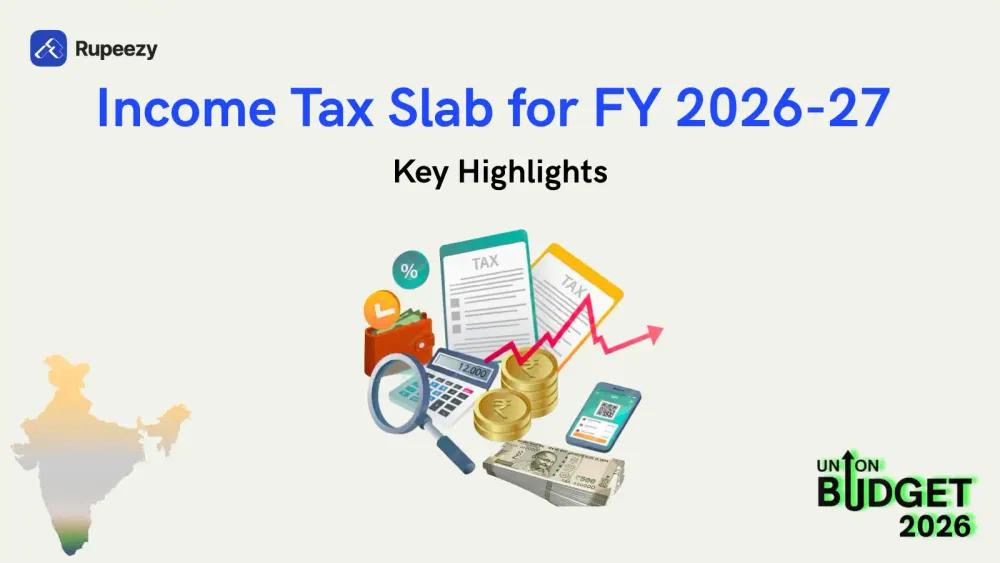Income Tax Slab for FY 2026-27 (Key Highlights)


00:00 / 00:00
Finance Minister Nirmala Sitharaman presented the Union Budget of 2026-27 on February 1, 2026, at 11:00 AM, outlining the government’s economic priorities with a strong focus on growth, infrastructure, and long-term stability. Unlike the previous year, the Budget does not introduce any changes in income tax slabs, ensuring continuity and certainty for taxpayers.
Key highlights include a sharp push to public capital expenditure, major announcements in infrastructure, healthcare, and manufacturing, and several customs duty exemptions to reduce costs and support domestic industries. The Old and New Tax Regimes both remain unchanged, allowing taxpayers to continue with their existing tax planning approach.
Here is a comparison of Income Tax Slab rates applicable for FY25-26 and FY26-27.
Income Tax Slab
Income Slab [Rs.] | Old Tax Regime Rate | New Tax Regime Rate |
Up to 2,50,000 | Nil | Nil |
2,50,001 – 3,00,000 | 5% | Nil |
3,00,001 – 5,00,000 | 5% | 5% |
5,00,001 – 7,00,000 | 20% | 5% |
7,00,001 – 10,00,000 | 20% | 10% |
10,00,001 – 12,00,000 | 30% | 15% |
12,00,001 – 15,00,000 | 30% | 20% |
Above 15,00,000 | 30% | 30% |
Since there is no revision in income tax slabs, the tax structure applicable in FY25-26 will continue for FY26-27 as well.
According to the existing provisions of the New Tax Regime, eligible individuals can still benefit from standard deductions and rebates as applicable under current rules, subject to income limits.
Tax Rebate
Under the New Tax Regime, resident individuals with income up to the specified rebate threshold will continue to receive tax relief as per existing provisions. The government has focused this year on simplifying compliance and improving ease of filing rather than expanding rebate limits.
Understanding How Tax Rates Continue to Apply
Let’s understand taxation under the unchanged structure with an example of an individual earning 12,00,000 annually, considering the applicable standard deduction:
Initial Income Details:
Total Income: 12,00,000
Standard Deduction: 75,000
Taxable Income after Deduction: 11,25,000
Tax calculation based on existing slabs:
Income Range | Tax Rate | Tax Amount |
0 – 3,00,000 | 0% | 0 |
3,00,001 – 7,00,000 | 5% | 20,000 |
7,00,001 – 10,00,000 | 10% | 30,000 |
10,00,001 – 11,25,000 | 15% | 18,750 |
Other Key Changes Announced in Budget 2026
Healthcare Relief: Basic customs duty has been exempted on 17 cancer drugs, making life-saving treatment more affordable.
Infrastructure Push: Public capital expenditure has been increased to 12.2 lakh crore for FY27 to boost growth and employment.
High-Speed Rail: Seven high-speed rail corridors will be developed to improve connectivity between major economic hubs.
Manufacturing Boost: India Semiconductor Mission 2.0 has been announced, along with higher allocation for electronics manufacturing.
Rare Earth Corridors: Dedicated corridors will be developed in Odisha, Kerala, Tamil Nadu, and Andhra Pradesh.
MSME Support: A 10,000 crore MSME Growth Fund will be set up to create globally competitive enterprises.
Conclusion
The Union Budget for 2026-27, presented by Finance Minister Nirmala Sitharaman, focuses on stability with growth. By keeping income tax slabs unchanged and increasing public investment, the Budget aims to strengthen infrastructure, healthcare, and manufacturing while maintaining fiscal discipline. This approach is expected to support long-term economic growth and provide predictability for taxpayers and businesses alike.
The content on this blog is for educational purposes only and should not be considered investment advice. While we strive for accuracy, some information may contain errors or delays in updates.
Mentions of stocks or investment products are solely for informational purposes and do not constitute recommendations. Investors should conduct their own research before making any decisions.
Investing in financial markets are subject to market risks, and past performance does not guarantee future results. It is advisable to consult a qualified financial professional, review official documents, and verify information independently before making investment decisions.

All Category










